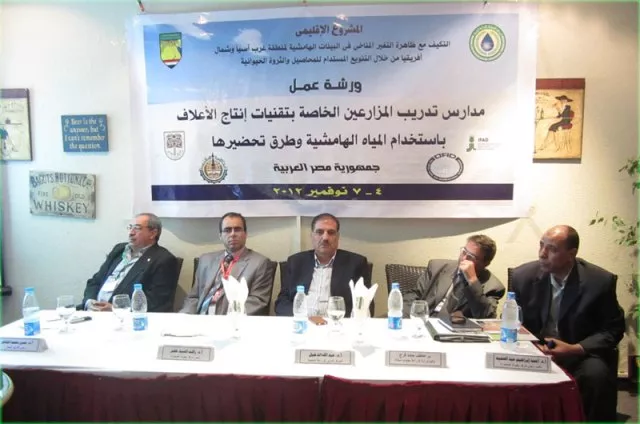ICBA conducts training workshop in Egypt “Farmer Schools for Forage Production and Utilization Techniques under the use of Marginal Water Resources”
7 نوفمبر 2012
The International Center for Biosaline Agriculture (ICBA) has conducted a training workshop in Egypt on 4-7 November, 2012 – titled: “Farmer schools for Forage production and utilization techniques under the use of marginal water resources”. This training workshop is part of the regional project “Adaptation to Climate Change in WANA Marginal Environments through Sustainable Crop and Livestock Diversification”, which involves eight partner countries: Egypt, Jordan, Tunisia, Oman, Palestine, Syria, United Arab Emirates, and Yemen. This project is funded by several international donors namely the International Fund for Agricultural Development (IFAD), the OPEC Fund for International Development (OFID), Islamic Development Bank (IDB), and the Arab Fund for Economic and Social Development (AFESD).
The main objective of this workshop was to develop a model for farmers’ school on the integrated forage-livestock systems under the utilization of marginal quality water resources to be replicated in all partner countries. In addition, the training aimed to train extension facilitators to carry out in-country farmers’ school and to involve few progressive farmers from the countries, who are part of the project activities, to be trained and to work as facilitators in technology transfer and adoption in their community. Twenty five senior extension staffs from Egypt, Jordan, Tunisia, Oman, United Arab Emirates, and Yemen had participated in the training workshop in addition to the participation of over forty farmers from Egypt, Jordan and Yemen.
“The farmers’ school was extremely successful and received extreme media coverage in Egypt and a high level participation of decision makers and NGOs”, said Dr. Abdullah Dakheel, coordinator of this project and the workshop.
The outcome of the workshop was reflected by developing a work plan by the partner countries to establish farmer field schools in their respective countries. Farmers’ schools will be divided according to summer crops schools and to winter crops schools and these schools will be mainly targeted towards small holder farmers and rural women role in the integrated forage-livestock systems.









